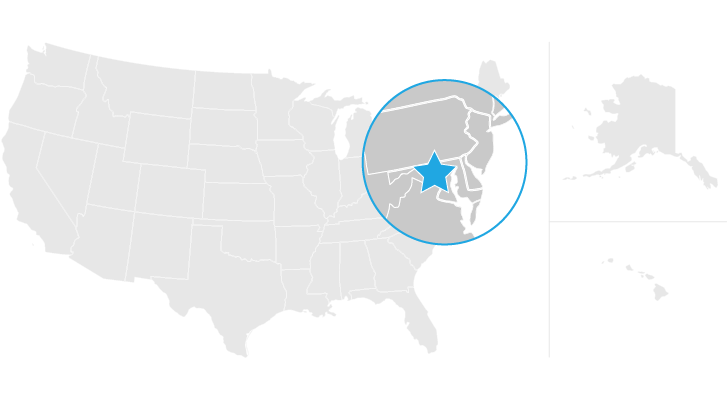Washington, D.C. does levy an estate tax on the estates of certain people after they have died. Specifically, the D.C. estate tax applies to any estate worth more than $4,988,400 in 2026. This is up from past years. The rate of the DC estate tax is graduated and runs from 11.2% to 16%. Estate planning isn’t easy, and if you are planning for your estate or dealing with the estate of a loved one, you may need some help.
Consider finding a financial advisor to help you build an estate plan. Speak with an advisor today.
Washington, D.C. Estate Tax Exemption
For 2026, the Washington, D.C. estate tax exemption is $4,988,400. That means if the decedent dies in 2026, it only applies to assets in excess of $4,988,400.
The estate tax exemption in D.C. is not portable between spouses. When the second of two spouses dies, that person can only apply his or her exemption, not that plus the exemption the deceased partner was entitled to.
Washington, D.C. Estate Tax Rate
The estate tax rate in D.C. is progressive, meaning that the rate goes up as the size of the estate increases. Below are the brackets for the 2026 tax year. The estate tax in Washington, D.C. ranges from 11.2% to 16%.
Washington, D.C. Estate Tax Rates
| Taxable Estate | Marginal Rate |
| $4,988,400-$5,000,000 | 11.2% |
| $5,000,000-$6,000,000 | 12% |
| $6,000,000-$7,000,000 | 12.8% |
| $7,000,000-$8,000,000 | 13.6% |
| $8,000,000-$9,000,000 | 14.4% |
| $9,000,000-$10,000,000 | 15.2% |
| $10,000,000+ | 16% |
What Is the Estate Tax?

The estate tax is levied against some estates after someone has died but before the money passes on as directed in the deceased’s will or other legal documents. It generally only applies to estates worth a certain amount as determined by the state government levying the tax. The federal government also has an estate tax.
The estate tax is not the same as the inheritance tax, which is paid by someone receiving money from a person who recently died after they’ve gotten the money.
Washington, D.C. Inheritance Tax and Gift Tax
There is no inheritance tax in Washington, DC. If you are getting money from someone who lived outside of D.C. when he or she died died, though, check local laws. In Kentucky, for instance, all in-state property is subject to the inheritance tax even if the person taking ownership lives elsewhere.
D.C. also does not have a gift tax. The federal gift tax for 2026 kicks in at $19,000 in annual gifts, which is the same as it was for 2025.
Washington, D.C. Estate Tax for Married Couples
The Washington, D.C. estate tax is not portable between couples. When both spouses die, only one exemption is applied to the estate.
Federal Estate Tax
The federal estate tax has a much higher exemption level than the D.C. estate tax. The estate tax exemption for 2026 is $15 million, up from $13.99 million in 2025. Unlike the D.C. estate tax exemption, the federal exemption is portable between spouses. This means that with the right legal steps, a married couple can protect up to $30 million in 2026 upon the death of both spouses.
If an estate tax exceeds that amount, the top tax rate is 40%. A full chart of federal estate tax rates is below:
Federal Estate Tax Rates
| Taxable Estate | Marginal Rate |
| $1 – $10,000 | 18% |
| $10,000 – $20,000 | 20% |
| $20,000 – $40,000 | 22% |
| $40,000 – $60,000 | 24% |
| $60,000 – $80,000 | 26% |
| $80,000 – $100,000 | 28% |
| $100,000 – $150,000 | 30% |
| $150,000 – $250,000 | 32% |
| $250,000 – $500,000 | 34% |
| $500,000 – $750,000 | 37% |
| $750,000 – $1,000,000 | 39% |
| $1,000,000+ | 40% |
Overall Washington, D.C. Tax Picture

Washington, D.C. is moderately tax-friendly for retirees. Social Security payments are not taxed, but withdrawals from retirement accounts are fully taxed. The income tax in Washington, D.C. ranges from 4% to 10.75%. If you are moving to Washington and want to figure out your take home pay, use SmartAsset’s D.C. paycheck calculator.
The average property tax in the District is 0.63%, which is fairly low on a national scale.
Resources for Estate Tax Help
- If the estate tax seems overwhelming, consider getting a financial advisor to help. Finding a financial advisor doesn’t have to be hard. SmartAsset’s free tool matches you with vetted financial advisors who serve your area, and you can have a free introductory call with your advisor matches to decide which one you feel is right for you. If you’re ready to find an advisor who can help you achieve your financial goals, get started now.
- If you have a sizable estate, estate taxes on either the state or federal level could be hefty. However, you can easily plan ahead for taxes to maximize your loved ones’ inheritances. For example, you can gift portions of your estate in advance to heirs, or even set up a trust.
Photo credit: ©iStock.com/vistoff, SmartAsset, ©iStock.com/kupicoo
